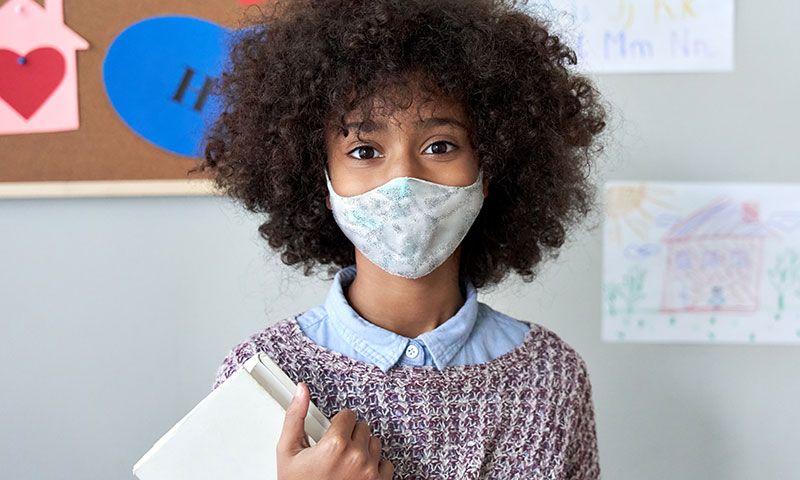The Omicron variant is now the most widespread COVID‑19 variant in the U.S. The highly transmissible variant is causing a surge in cases. For many parents, it's also causing renewed concern about their child's health.
Jeffrey Kahn, M.D., Director of Infectious Disease at Children's Health℠ and Professor at UT Southwestern, encourages families to continue to take precautions as Omicron spreads. "We've been at this for a long time," says Dr. Kahn. "Everyone has COVID-fatigue, and it's difficult to deal with another variant. But as the virus continues to evolve, it's more important than ever for parents and children to stay vigilant."
Dr. Kahn explains what we know about the Omicron variant and the best ways to keep your family healthy.
What is the Omicron variant and what should parents know?
Omicron (also known as B.1.1.529) is a variant of the SARS-CoV-2 virus that causes COVID‑19. It was first identified in South Africa in November 2021 and found in the U.S. in early December 2021. Here are six facts about the Omicron variant that parents should know.
1. The Omicron variant is spreading fast.
As of January 2022 – only one month after the variant was first detected in the U.S. – Omicron accounts for about 98% of all new COVID‑19 cases in the country. "This variant is spreading like wildfire," says Dr. Kahn.
Omicron is much more contagious than prior COVID‑19 variants, including Delta. One reason for this may be the variant's high number of mutations in the spike protein. This can help it evade immunity, or a body's built-up protection to the virus. Experts at the Centers for Disease Control and Prevention (CDC) expect that anyone with Omicron infection can spread the virus to others, even if they are vaccinated or don't have symptoms.
"The way the Omicron variant is spreading right now, there is a great likelihood you're going to get exposed if you're out in public," says Dr. Kahn.
While this may be frightening, one silver lining of the variant's quick spread is that the spike in cases may be short-lived. "This variant is spreading through our country very quickly, and what we may experience is a very intense but narrow peak of activity," says Dr. Kahn. "Of course, we can't know this for sure."
2. Children are being affected by Omicron.
Because Omicron is highly contagious, more and more people are becoming infected with COVID‑19. This includes children, who may be at increased risk for infection if they are too young to be vaccinated. As cases increase, the number of children hospitalized with COVID‑19 is also rising. In fact, the rate of new COVID‑19 hospitalizations in children reached a record-high with the Omicron surge.
Parents may take comfort in the fact that Omicron does not appear to cause more severe illness in children than prior variants. In general, children are still at lower risk for severe illness from COVID‑19 than adults.
However, children with certain medical conditions remain at increased risk for severe illness. Children can also spread the virus to others who are at high risk. Lastly, we're still learning about possible long-term effects of COVID‑19 – even from mild COVID‑19 infection. For all of these reasons, it's important to take steps to reduce risk of infection.
3. We're still learning about Omicron.
Each new variant, like Omicron, varies in how contagious it is and how virulent (harmful) it may be. Each variant can affect the immune system differently and change how effective vaccination is against infection.
Researchers are still working to uncover how the Omicron variant behaves and how it responds to a person's built-up immunity. We still don't know how severe the effects of Omicron are. Some studies suggest this variant may cause less damage to the lungs and has a lower risk of hospitalization. While that is good news, the risk of severe illness remains, particularly in individuals with risk factors.
There is evidence that prior COVID‑19 infection may not give a person protection against the Omicron variant. There are also more breakthrough cases of Omicron – cases where people are vaccinated but still contract the virus.
"This variant has far more mutations in the spike protein, which is what the vaccine is targeting," explains Dr. Kahn. "However, even if the vaccines are less effective against Omicron than they were against Delta, they are still effective in preventing severe disease."
Because of this, vaccination remains an important way to protect your family, as well as taking other precautions.
4. Symptoms of Omicron in children are similar to past variants.
With the increased spread of COVID‑19, it's important to watch for any symptoms of infection. In general, symptoms of Omicron in children remain similar to symptoms caused by prior variants. COVID‑19 symptoms in children can include:
- Fever (at least 100°F)
- Chills
- Congestion or runny nose
- Cough
- Diarrhea
- Fatigue
- Headache
- Muscle or body aches
- Nausea or vomiting
- New loss of taste or smell
- Shortness of breath or trouble breathing
- Sore throat
If your child starts to show COVID‑19 symptoms, get them tested for COVID‑19 and contact your primary care provider for guidance. If your child tests positive, isolate to prevent spread of the virus.
Most children have mild illness and are able to recover at home. However, watch for the following warning signs that your child requires emergency care:
- Trouble breathing
- Persistent pain or pressure in the chest
- New confusion
- Inability to wake or stay awake
- Pale, gray or blue-colored skin, lips or nail beds, depending on skin tone
- Signs of dehydration (dry mouth, no tears, decreased urination) or inability to take liquids by mouth
Learn more about what to do if your child is exposed to COVID‑19 and when to go to the ER for care.
5. Omicron and COVID‑19 are not the only illnesses spreading.
The Omicron surge is happening during winter – a time when many other common illnesses are spreading. In particular, cases of flu are on the rise. It can be difficult to tell the difference between COVID‑19 and flu or other respiratory illnesses.
Because of this, it's extra important to take precautions to keep your child healthy during this time. Make sure any child ages 6 months and older gets their annual flu vaccine, in addition to their COVID‑19 vaccine and booster if eligible.
If your child gets the sniffles, don't assume it's just a cold. With increased spread of COVID‑19, get your child tested to confirm a diagnosis if possible. Keep your child home if they are not feeling well and continue daily precautions like frequent hand washing to prevent the spread of germs.
6. There are ways you can help protect your family from Omicron and future variants.
The best way to protect children and families against COVID‑19 remains vaccination. The COVID‑19 vaccine is a safe and effective way to prevent against severe illness.
As of January 2022, more than 15.7 million children in the U.S. ages 12 to 17 years old have gotten vaccinated, and 7 million children ages 5 to 11. Getting vaccinated gives children the opportunity to enjoy more pre-pandemic activities as well as peace of mind. If your child is too young to be vaccinated, make sure everyone around them who is eligible is vaccinated.
As new variants of the virus continue to emerge, parents and children should take additional steps to reduce the spread of infection.
- Get the COVID‑19 booster if eligible
- Mask up and make sure to use a high quality, well-fitting mask
- Keep hands clean by washing or sanitizing
- Avoid crowds when possible
- Get tested if you show any symptoms
- Stay home when sick
If you are going to see high-risk individuals during the Omicron surge, take extra precautions to keep them healthy. Try to limit your exposure ahead of seeing them, wear masks when in public and get a test if you suspect any exposure to the virus.
Lastly, as you take steps to keep your family physically healthy, don't forget to check in emotionally – both with yourself and your children. This new wave of infections is stressful, and it's okay to feel sad or frustrated that we're facing a spike in cases again. See advice for coping with stress and anxiety as a parent, as well as advice for supporting mental health in children.
See more COVID‑19 resources
Children's Health is committed to remaining a trusted source of health information and care for you and your family. See more resources to keep your family healthy at the Children's Health COVID‑19 hub.

Thank you!
You are now subscribed to the Children's Health Family Newsletter.
Children's Health will not sell, share or rent your information to third parties. Please read our privacy policy.
